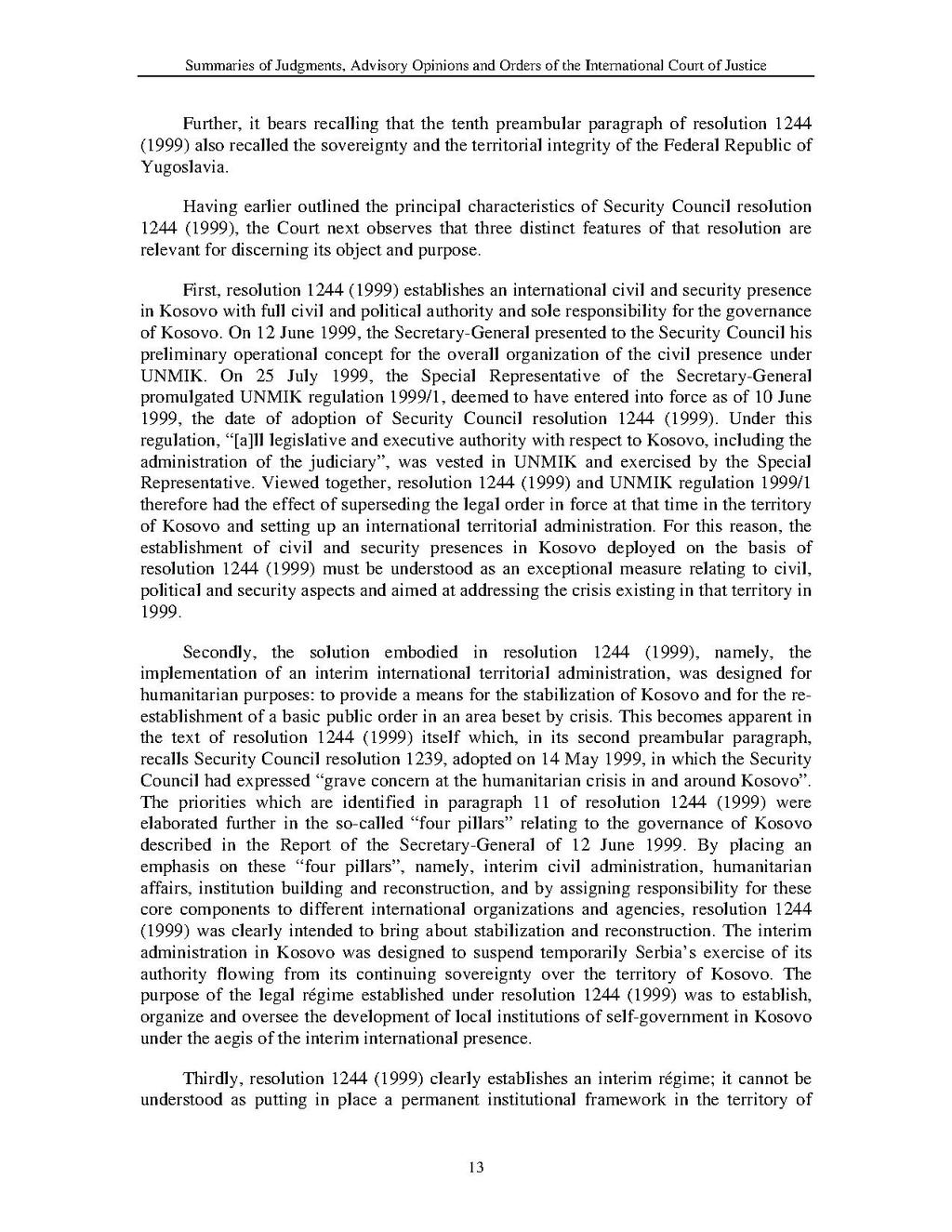Summaries of Judgments, Advisory Opinions and Orders of the International Court of Justice
Further, it bears recalling that the tenth preambular paragraph of resolution 1244 (1999) also recalled the sovereignty and the territorial integrity of the Federal Republic of Yugoslavia.
Having earlier outlined the principal characteristics of Security Council resolution 1244 (1999), the Court next observes that three distinct features of that resolution are relevant for discerning its object and purpose.
First, resolution 1244 (1999) establishes an international civil and security presence in Kosovo with full civil and political authority and sole responsibility for the governance of Kosovo. On 12 June 1999, the Secretary-General presented to the Security Council his preliminary operational concept for the overall organization of the civil presence under UNMIK. On 25 July 1999, the Special Representative of the Secretary-General promulgated UNMIK regulation 1999/1, deemed to have entered into force as of 10 June 1999, the date of adoption of Security Council resolution 1244 (1999). Under this regulation, "[a]ll legislative and executive authority with respect to Kosovo, including the administration of the judiciary", was vested in UNMIK and exercised by the Special Representative. Viewed together, resolution 1244 (1999) and UNMIK regulation 1999/1 therefore had the effect of superseding the legal order in force at that time in the territory of Kosovo and setting up an international territorial administration. For this reason, the establishment of civil and security presences in Kosovo deployed on the basis of resolution 1244 (1999) must be understood as an exceptional measure relating to civil, political and security aspects and aimed at addressing the crisis existing in that territory in 1999.
Secondly, the solution embodied in resolution 1244 (1999), namely, the implementation of an interim international territorial administration, was designed for humanitarian purposes: to provide a means for the stabilization of Kosovo and for the reestablishment of a basic public order in an area beset by crisis. This becomes apparent in the text of resolution 1244 (1999) itself which, in its second preambular paragraph, recalls Security Council resolution 1239, adopted on 14 May 1999, in which the Security Council had expressed "grave concern at the humanitarian crisis in and around Kosovo". The priorities which are identified in paragraph 11 of resolution 1244 (1999) were elaborated further in the so-called "four pillars" relating to the governance of Kosovo described in the Report of the Secretary-General of 12 June 1999. By placing an emphasis on these "four pillars", namely, interim civil administration, humanitarian affairs, institution building and reconstruction, and by assigning responsibility for these core components to different international organizations and agencies, resolution 1244 (1999) was clearly intended to bring about stabilization and reconstruction. The interim administration in Kosovo was designed to suspend temporarily Serbia's exercise of its authority flowing from its continuing sovereignty over the territory of Kosovo. The purpose of the legal régime established under resolution 1244 (1999) was to establish, organize and oversee the development of local institutions of self-government in Kosovo under the aegis of the interim international presence.
Thirdly, resolution 1244 (1999) clearly establishes an interim régime; it cannot be understood as putting in place a permanent institutional framework in the territory of
13
